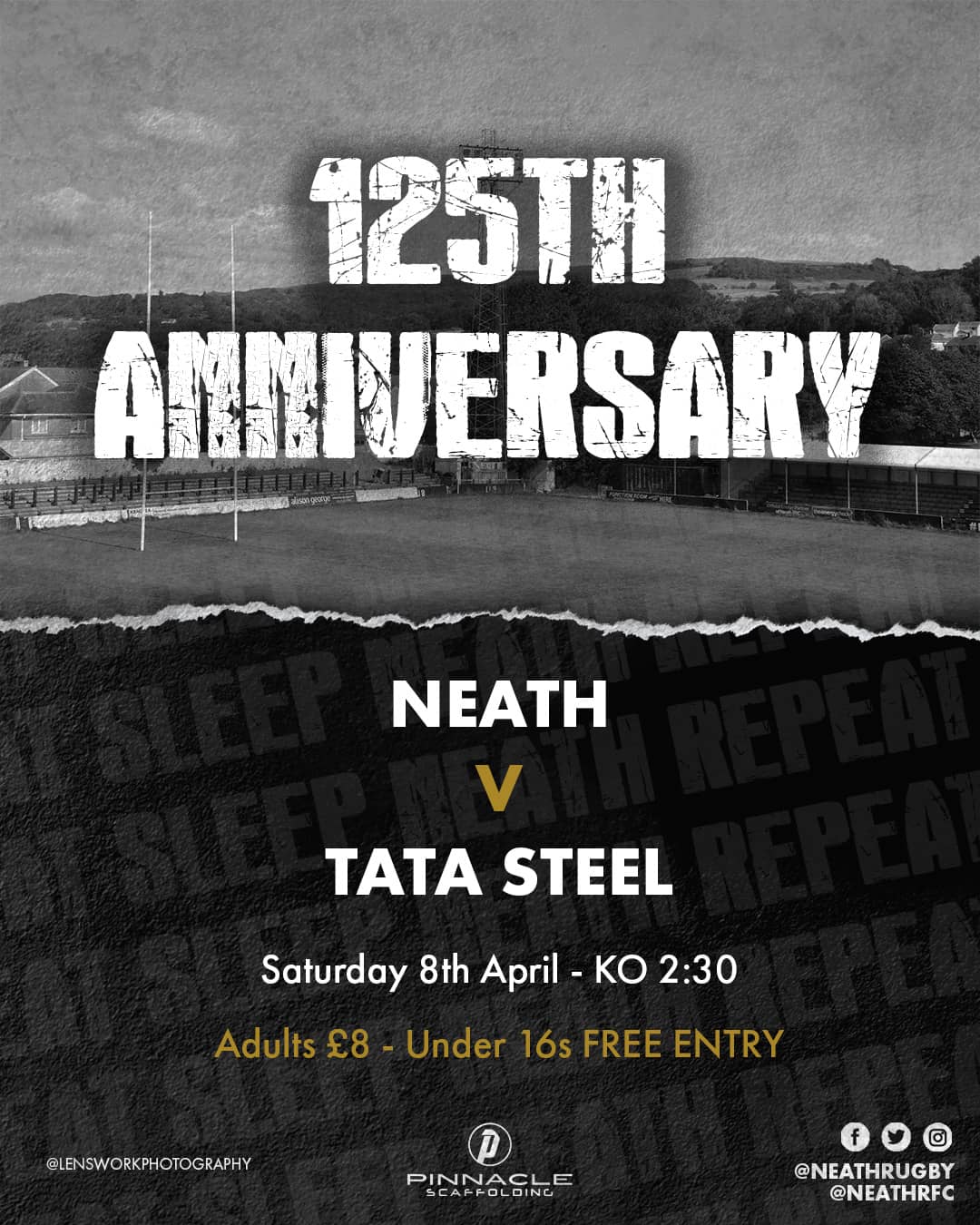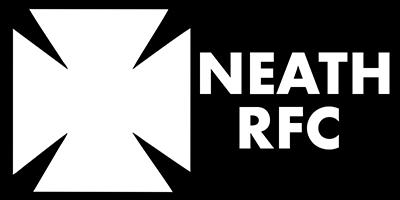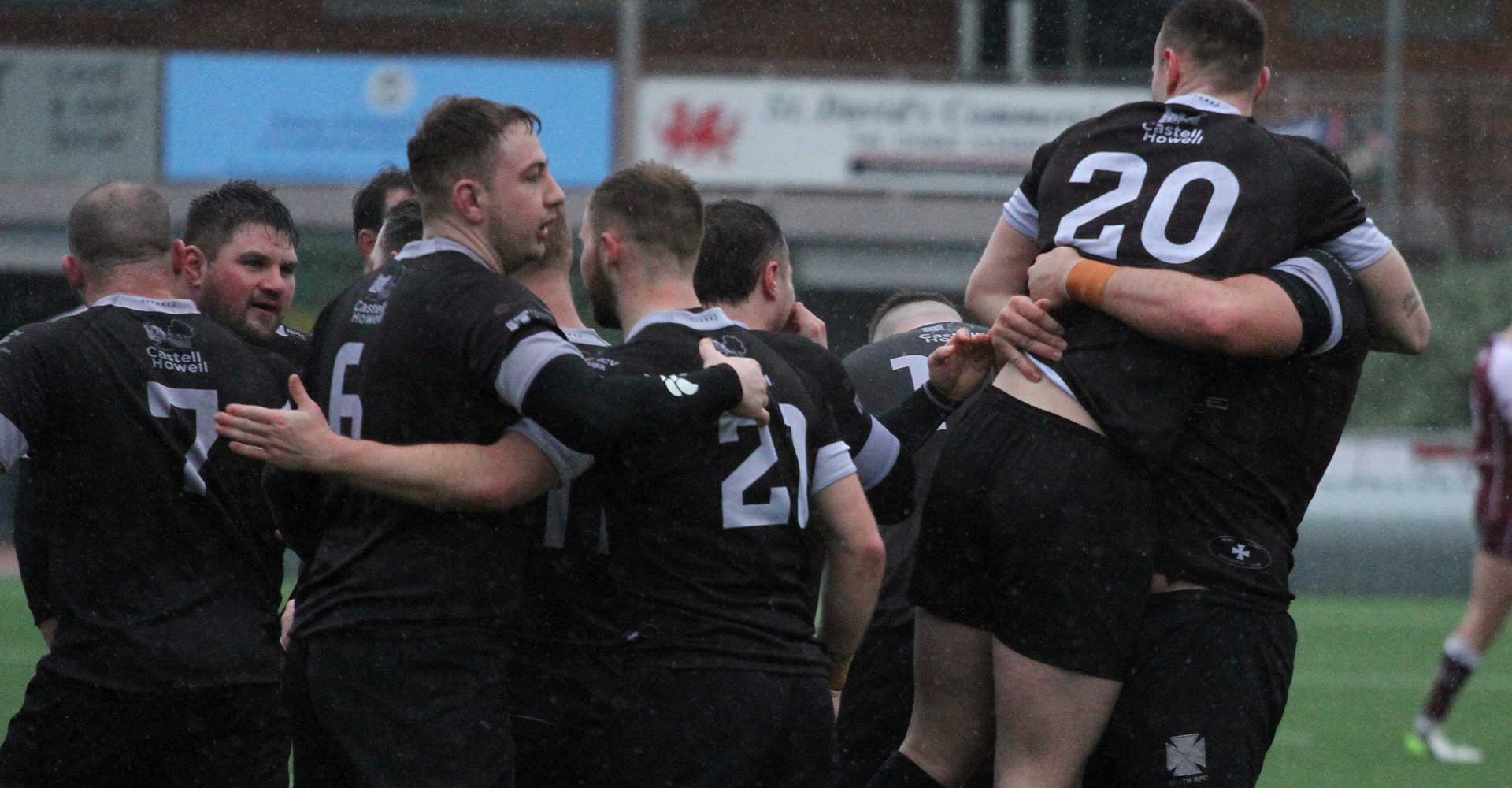
Come along and help us celebrate an important occasion !
If rugby grounds had birthday parties, there would be a special celebration at The Gnoll, Neath on Saturday… and a pretty big cake would be needed for all the candles !
For the small matter of 125 years ago on the second Saturday in April in the year 1898, Neath RFC returned to their Gnoll home after an absence of nearly ten years.
Although there is firm evidence that rugby football was first played in Neath in 1864, Neath RFC’s first recorded game – indeed, the first recorded club game in Wales – was actually played at The Gnoll against Swansea in 1872.
Establishing the Game even in a rugby-mad town like Neath was far from straightforward and at the start of the 1888/89 season there was “a dispute with the Cadoxton Cricket Club commensurate with the rental of £15 for use of The Gnoll Ground.”
The rugby men’s attitude hardened and, on August 7, it was reluctantly decided to leave The Gnoll and move more or less across the road, it being resolved that “Mr. Jones’ offer of the Bird-in-Hand Field from September to April for £ 5 be accepted.”
“Mr. Jones” was Thomas Jones, licensee of the Bird-in-Hand public house, and he was well placed to offer his field as he was treasurer of Neath RFC !
So it was that the Bird-in-Hand became the headquarters of the Welsh All Blacks who stayed awhile and enjoyed many fierce games until in 1897 there was a “rapprochement” with the Evan Thomas family who owned The Gnoll.
After a series of meetings between the Club’s representatives and Mr. Charles Evan Thomas, terms were eventually settled for Neath’s return on a 21 year-lease at an annual rental of £73 1s – £12,150 today !
Well-to-do supporters were keen to back the Club and, “with the help of 25 guarantors” who pledged £5 each (equivalent to £830 today) per year for each of seven years, the new lease was sealed.
Who were the brave 25 men to whom Neath RFC – and the Town – owes so much ?
Unfortunately, their names were not recorded for posterity but what is known is that the guarantors met ahead of a special members’ meeting held on Friday, March 18 to ratify the deal.
The meeting was widely reported : Mr. J.E. Moore (Dyffryn) presided, and he was supported by 18 gentlemen, many of them “founding fathers” of the Club who may very well have been guarantors :-
The Mayor (Councillor Abraham George), Alderman H.P. Charles, Messrs. W.H. David, D.M. Davies (chairman), Tom Williams, Dr. T.P. Whittington, Stanley Elt, Frank Dickens, Fred Williams, W. Richards, Tom Howells, James Gandy, Tom Jones (treasurer), P.W. Phillips, Alf Tench, D.J. Price (secretary), W.B. Morgan and L.J. Kempthorne.
The lessees were recorded as Messrs. J.E. Moore, W.H.P. Jenkins and E. Evans Bevan.
Neath’s first game back home in 1898 saw them celebrate with a 16-3 win over Morriston who were a first-class team in those days and enjoyed regular fixtures with Aberavon, Bridgend, Llanelli, Swansea – as well as Neath.
The Neath team that historic day was :-
Joe Davies; Will Jones (captain), Owen Harris, Charlie Morris, Jack Phillips; Harry Hanford, Charlie Powell; Mog Reynolds, Sam Davies, Dai Evans, Jack Linnard, Jim Thomas, Tom Hughes, Evan Arnold, Griff Lewis
Joe Davies dropped a goal and there were tries by Will Jones (2), Morgan Reynolds and Charlie Powell whose try was Neath’s first on the ground.
It is interesting to note that of the Neath team that day, Will Jones captained Neath for 9 seasons, Joe Davies and Charlie Powell were multi-Wales reserves but never capped while Sam Davies was another reserve for Wales v Scotland in 1899 but, when D.J. Daniel (Llanelli) withdrew, the selectors promoted Dick Hellings (Llwynypia) instead.
Sadly, Charlie Morris (sometimes known as “Tom”) was the first Neath player killed in World War I on December 28, 1914 while Morriston’s scorer the schoolmaster-wing Dai Davies later joined Neath and was also killed in World War 1.
The first try on the “new” Gnoll had actually been registered the previous Thursday in a charity game when the former Wales full back veteran Sam S. Clarke played and Will Jones scored for the Neath Clerks against the Neath Barbarians.
However, the new ground was incomplete. “The turf was very uneven in parts” wrote “Hotspur” of the “Post” who berated the “execrable conditions” available to the Press.
But Neath were back home and, since then, the “classic slopes of The Gnoll” have borne witness to many a grand game.
In 1908 the Australian tourists visited to play a combined Neath-Aberavon XV and then in 1912 Neath went it alone against South Africa and several contemporary reports reveal that Neath should have won.
The New Zealand Army XV arrived in 1919 and the southern hemisphere’s ‘Big Three’ repeated those visits through the last century.
Neath RFC has also hosted – and in most cases beaten – the national sides of Canada, Fiji, Japan, Spain, Uruguay, USA and West Germany while club sides from Argentina, Holland, Italy, France and Romania as well as the ‘home’ nations have come too.
It can safely be ventured therefore that memories of The Gnoll and of Neath have been carried to all corners of the rugby globe.
Careful nurturing of the playing surface over many years means that it remains one of the best grass pitches in Wales but the grandstands (added in the 1930’s and 1960’s) are beginning to show their age.
That is a problem not confined to Neath because there has been precious little investment in most of the great club grounds since the Welsh Game went regional.
Neath’s “temporary home” at the Bird-in-Hand Field disappeared a long time ago; Neath’s Civic Centre and Prince of Wales Drive were built there in the 1960’s and the site is now occupied by a new civic building, the multi-storey car park, stores, the new Neath library and leisure centre.
But rugby football lives on in Neath RFC and on Saturday Tata Steel will provide the “birthday” opposition, kick off is at 2.30pm.
The Easter Saturday weather promises to be fair – so let us hope that we have a memorable performance to do justice to the occasion ! MP


